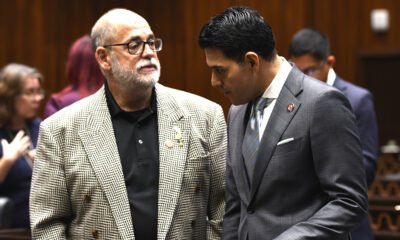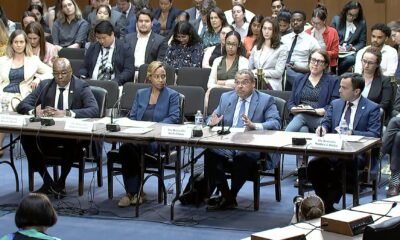Business
Families Battle to Save Arizona’s Life-Saving Parents as Paid Caregivers Program

Jaime Kelley confronted lawmakers with deep emotion, urging them to preserve funding for a program essential for caring for her adopted daughter, who requires around-the-clock ICU-level care. “We’ve been on the edge of a cliff,” she shared, representing many parents facing overwhelming stress while advocating for their severely disabled children amidst potential funding cuts.
As the House Appropriations Committee heard testimonies for over four hours, the atmosphere grew tense with urgency. Kelley, struggling to contain her tears, addressed her husband watching remotely with their daughter, asking him not to let Evelyn see her in distress. Following the hearing, the GOP-controlled committee narrowly passed a bill aimed at preventing the Division of Developmental Disabilities (DDD) from imminent financial collapse.
Despite the passage of the bill, which many viewed as a necessary measure, advocates expressed dissatisfaction. The proposed House Bill 2945 imposes significant restrictions on the Parents as Paid Caregivers (PPCG) program—a lifeline for families like Kelley’s. This program compensates parents for providing specialized care that exceeds typical parenting tasks, yet it may face limitations that could leave families struggling.
Initially funded entirely by the federal government, the PPCG program now requires the state to cover one-third of its costs. Since its expansion last year from 3,000 to 6,000 participants, significant financial strain has emerged, contributing to a $122 million shortfall in the DDD budget. Without legislative action, services for disabled individuals in Arizona could cease by month’s end.
Politically, responsibilities are shifting, with Republicans accusing Gov. Katie Hobbs of unilaterally extending the PPCG program. They demand reforms in exchange for funding, while Hobbs insists that immediate financial support is crucial and that any reforms can be negotiated later. The PPCG was established during the pandemic to address workforce shortages in caregiver services, allowing parents to step in as paid caregivers for their children.
Critics of the proposed reforms warn that capping hours at 40 per week—or even cutting it to 20 hours—will devastate families, increasing the risk of institutionalization for many disabled children. Michele Thorne, a caregiver advocate, emphasized the life-and-death stakes involved: “These families are not OK.”
Parents highlighted the impracticality of shifting caregiving responsibilities to third-party contractors, especially given the longstanding workforce crisis in Arizona’s caregiving sector. Despite attempts to amend the bill to preserve the 40-hour cap while introducing reforms, bipartisan efforts were thwarted in favor of more stringent Republican proposals.
The final vote passed with only one vote to spare, leading to emotional reactions from lawmakers and advocates in attendance. Rep. Julie Willoughby, who opposed the bill, expressed her deep disappointment, stating, “I’m pro-life, and I’m pro-life through the entire spectrum of life.” Criticism from Democrats followed, framing the funding struggles as a political power play that disregards the needs of disabled individuals and their families.
Following the committee’s decision, Governor Hobbs condemned the actions of Republican lawmakers in a statement, describing them as detrimental to everyday Arizonans. She reiterated her willingness to collaborate on a serious funding solution but criticized the current legislative approach as inadequate for the families relying on the PPCG program.


















